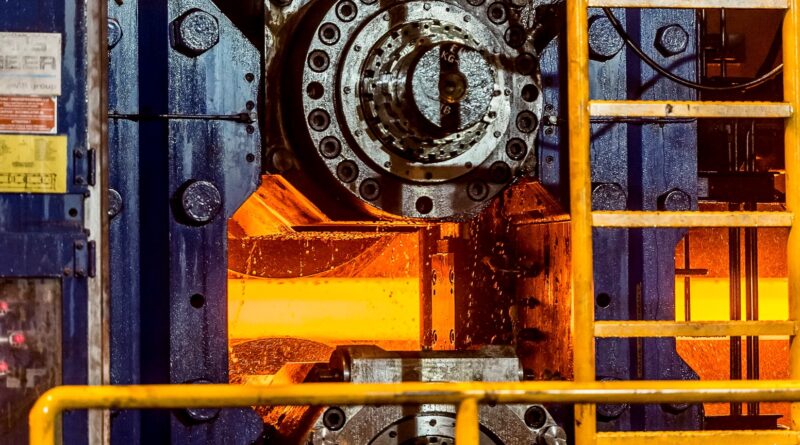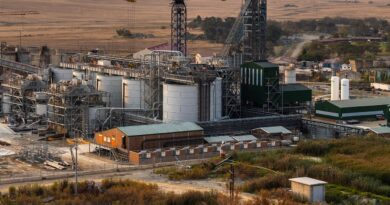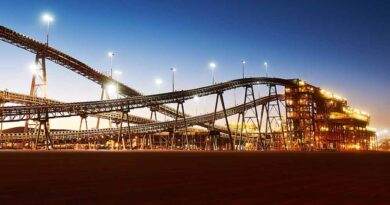ArcelorMittal South Africa reports loss of R448 million
ArcelorMittal South Africa says weaker trading environment with substantially lower international market prices and stagnant economic growth resulted in headline loss of R448 million. Other indicaters include:
- Sales volumes up 3% to 1.2 million (crude steel production up 29% to 1.4 million)
- Realised rand steel prices down 8% (down 22% in dollar terms)
- Raw material basket (RMB) up 2% (rand terms) (international RMB down 13% in rand terms)
- Value Plan added R1 007 million (2022 H1: R577 million)
- Fixed costs up 3% to R3 549 million (2022 H1: R3 448 million)
- EBITDA down 86% at R499 million (2022 H1: R3 591 million)
- (2022 H1: R3 025 million profit)
- Net borrowings of R2 990 million (2022 H2: R2 808 million)
- Renewables and regional infrastructure projects expected to support steel demand
- Medium and longerterm investment case remains intact
- Modified 2016 B-BBEE transaction to improve the prospect of meaningful future value creation
In February 2023, at the announcement of the company’s 2022 financial results, it was indicated that, barring the impacts of loadshedding and rail service unreliability, the six-month outlook for the trading environment appeared to be improving compared to the difficult close to 2022. Unsustainable price-cost pressures and positive movements in early 2023’s international steel prices offered reasons for some optimism.
Despite the buoyance of 2021 and the first half of 2022 having passed (remembering that the latter is the comparable period for this interim 2023 report), the international trading environment in the first half of 2023 benefitted from the end to de-stocking and less painful energy prices. However, locally, the trading environment caught no such tail-winds, as the burden of electricity loadshedding, high inflation, high interest rates and mixed growth (only automotive reflected noteworthy growth of 8,3%) in key steel consuming sectors such as manufacturing (+1.0%), machinery and equipment (+1.0%), mining (-1.1%) and construction (0%), pummelled already fragile consumer confidence.
Falling international commodity demand affected most sectors. Understandably, steel demand remained muted, which put significant pressure on local prices.
The company committed to adopt a flexible approach to operating plants in reaction to the available order book, adjusting fixed cost levels accordingly, and following an assertive cash management process.
By and large these actions were implemented; mostly by design, but in some instances due to unplanned internal and external interruptions.
However, the softness of the market amid the unprecedented severity of the electricity loadshedding in the last six months, was very much underestimated, which in turn affected the response time with which production could be adjusted in a responsible and well-considered manner.
Building and maintaining any semblance of operating rhythm, which is an absolute necessity in running a continuous, integrated steel making process in a cost-aware manner, proved especially problematic.
The challenging trading environment not only made the anticipated unwind of the higher net working capital position, which had built up in last quarter of 2022, very difficult. This resulted in additional cash being utilised in operations for the period under review.
Consequently, the net borrowings position of R2 990 million was R1 903 million and R182 million higher compared to June 2022 and December 2022 respectively. Actions are underway to improve the company’s net borrowing position in the wake of the weaker-for-longer steel trading environment in the region.
Sales volumes were 3% up, with crude steel production 29% higher against the comparable period. Against the immediately preceding six months, sales volumes improved by 19%, while crude steel production was on par.
ArcelorMittal South Africa’s realised average steel prices decreased by 8% in Rand terms. Its raw material basket increased by 2% with, in absolute terms, imported coking coal having increased by 1%, while iron ore increased by 4% and scrap decreased by 5%. After accounting for conversion cost, the variable cash cost of steel decreased by 5% (based on crude steel production). Fixed costs increased by R101 million (3%) to R3 549 million. The outcome of the 2023 wage negotiations, which yielded a three-year agreement, was beneficial for both the company and its employees. The agreement provides the certainty and stability required to allow for a focus on performance, productivity and value add.




